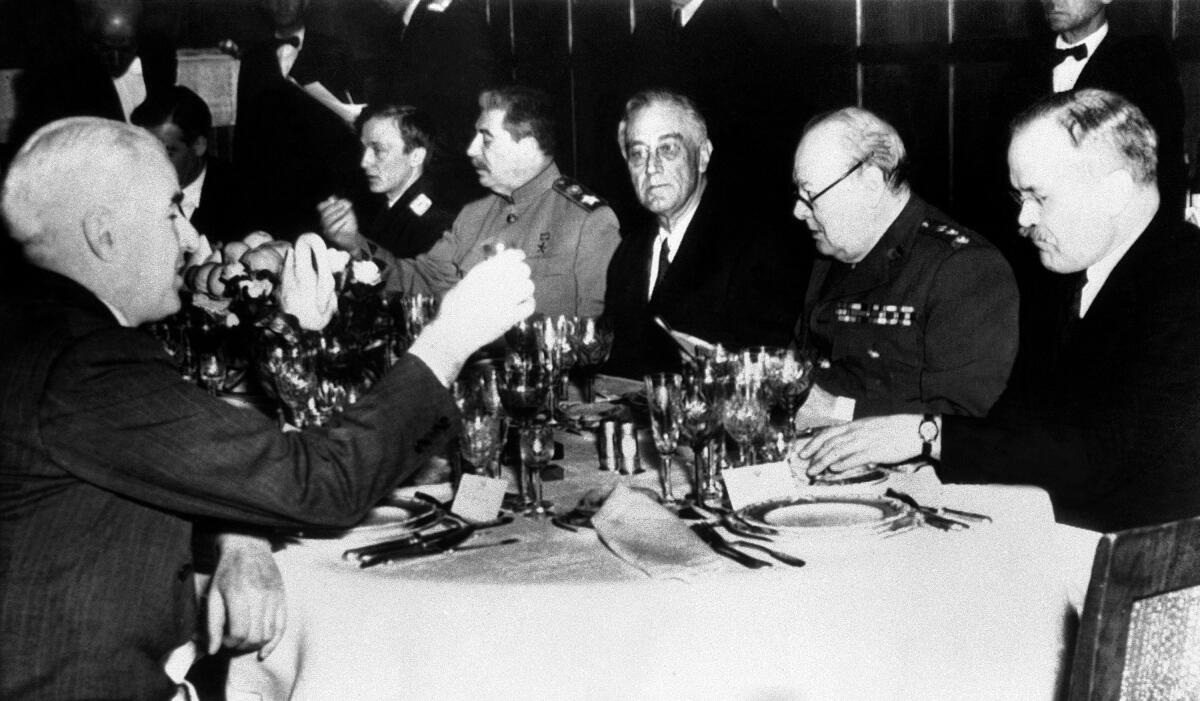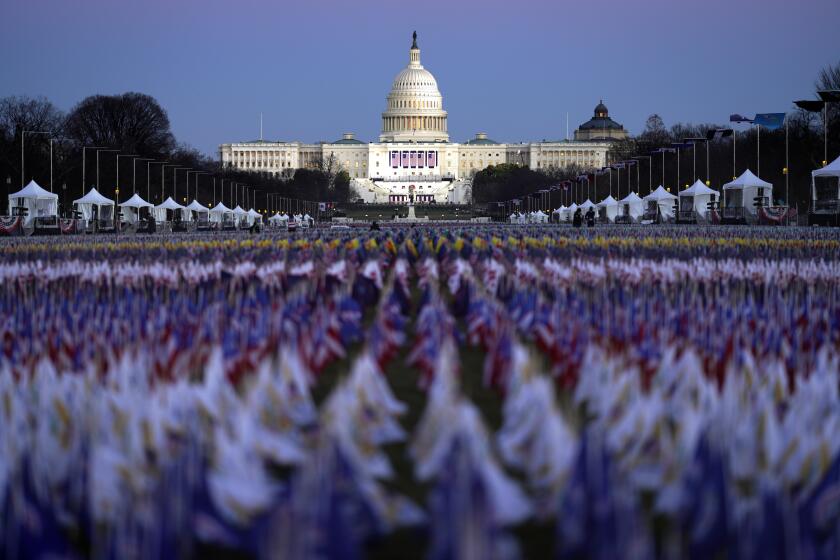Op-Ed: Society’s never been more polarized. How storytellers could help heal our divides

- Share via
At the end of a fancy dinner for Commonwealth dignitaries in London, Winston Churchill spotted a fellow guest about to steal a valuable silver saltshaker from the table. Caught between the desire to avoid an undignified contretemps and the equal and opposite desire to not let the scoundrel get away with it, Churchill did something ingenious.
He picked up the matching silver pepper shaker, slipped it inside his coat pocket, wandered over to the dignitary in question, set it on the table and whispered conspiratorially: “I think they’ve seen us. We’d better put them back.”
Problem resolved.
At a time when society has never been more divided, students of conflict resolution — along with the rest of us — could do a lot worse than carefully examine this master class by Churchill on persuasion. Differences in opinions and perspectives are part and parcel of life. What’s important is how we deal with them.
It would’ve been so easy for Churchill to have called out the would-be thief’s behavior. To have denigrated the guest. But he didn’t. Churchill drew a line, all right. But instead of drawing it between himself and the thief, he drew it so they were on the same side of it. He and the thief became an “us” and the rest of the guests “them.” In so doing, Churchill harnessed a fundamental principle of influence: It’s more profitable to cajole from the inside than it is to hold sway from the outside.
We all draw lines, of course. If we didn’t have a line between pass and fail, then what would be the point of exams? If we didn’t have a line between 55 and 56, then what would be the purpose of speed limits? Lines create order and enable us to navigate the world on the basis of rules, expectations and structure. They are meant to make life simpler.
But in recent times the lines we’ve been drawing have only made life more complicated. They’ve gotten way too thick, causing deep-rooted division and unprecedented polarization.
Why is this? More importantly, what can we do about it?
The answer lies buried in our distant ancestral past. Yes, there are the niche, everyday lines we draw that help us make sense of the world — what I call our “categorization instinct.” But by researching our evolutionary history, I’ve been able to cast a spotlight on three bigger, broader and bolder lines that, over time, natural selection has equipped us all to draw. Not to help us make sense of the world — but to ensure we survive.
One negative result of political polarization is closed minds that aren’t open to facts and independent thinking. The prime recent example is so many Republicans buying Trump’s lie that the election was “stolen” from him by voter fraud.
The first of these lines we draw is shared with the rest of the animal kingdom. It’s the physiological line between dinner and diner: fight or flight. The other two are unique to humans. The social line between us and them, and the moral line between right and wrong. “Us and them” showed up when our prehistoric ancestors first began living in small groups around 5 million years ago. Right and wrong developed to keep those groups together.
But society as a whole has recently been endeavoring to collapse two of these categories into one. While natural selection enabled us to distinguish between “us” and “them” independently of “right” from “wrong,” these two axes have been mixed together into a dangerous and discriminatory cocktail of militant self-interest. Those who are with us are right. And those who are against us are wrong. This has led to deep-rooted polarization and institutional black-and-white thinking.
A 2019 study, for instance, presented Republicans and Democrats with examples of different moral violations perpetrated by various individuals. The research showed it wasn’t the violation that most concerned the participants but the political allegiance of the perpetrator. Democrats were more lenient on Democrats. Republicans, even more so, on Republicans.
In other words, participants in the study did the opposite of what Churchill did while dealing with the stolen saltshaker. They tagged “them” as “wrong” and “us” as “right” with a hair-trigger cognitive labeling gun.
Our categorization instinct evolved to help us simplify the world — not oversimplify it.
To combat this oversimplification, we need to think creatively. Quite literally. The answer lies in the power of group identity to shape our thinking. We join a group because we think it’s right, then think we’re right because we’re part of the group. Policy isn’t going to change that. Policy is just one group telling another group what to do. It’s more of the same. We’re not going to “conform away” the lines we’ve been drawing between us. Or comply our way to a more tolerant, less polarized society. We need to “feel” our way there instead.
Making laws isn’t the way forward. Telling — and listening to — stories is.
Pakistani filmmaker Sharmeen Obaid-Chinoy brought global attention to honor killings in Pakistan with her 2016 Oscar-winning documentary “A Girl in the River.” The film recounts the story of a young woman who survives her father and uncle’s attempt to murder her after she marries without her family’s approval. But with the help of gas station workers, paramedics, doctors, surgeons and police who provide extra security for her — men who champion women’s rights rather than deny them — she survives.
The film heightened public consciousness. And that helped change public policy.
Fiction can be just as powerful a medium in boosting empathy. When researchers at Washington University in St. Louis scanned the brains of study participants as they read stories, they found that the reader’s brain reacted when a character’s goal changed.
The response occurred in the prefrontal cortices, the neural ZIP Code associated with understanding where others are “coming from.” That is, not just what people do but why they do it — the complex tissue of motives, reasons and intentions that underlie behavior.
As Churchill demonstrated at the dinner party, conflict resolution is an art form. But efforts to depolarize society shouldn’t be left just to politicians. Our storytellers will be critical to healing our divides — the novelists, filmmakers, musicians and other artists whose work has the ability to sculpt the truth.
Kevin Dutton is a research fellow in experimental psychology at Oxford University and the author of “Black-and-White Thinking: The Burden of a Binary Brain in a Complex World.”
More to Read
A cure for the common opinion
Get thought-provoking perspectives with our weekly newsletter.
You may occasionally receive promotional content from the Los Angeles Times.










